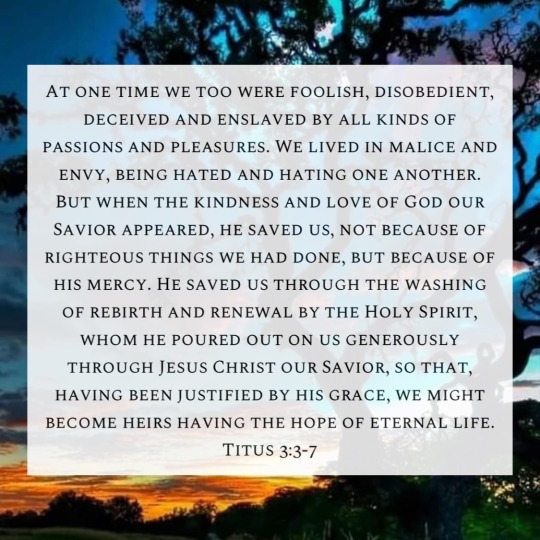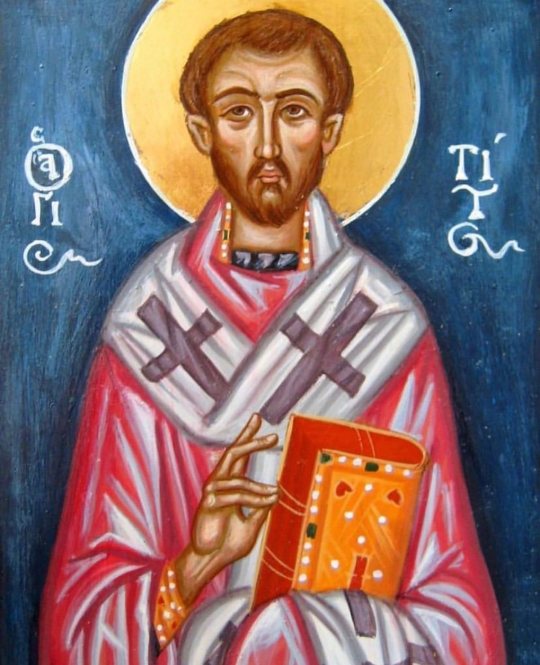#The Epistle of Titus
Text

Be Ready for Every Good Work
1 Admonish them to be subject to dominion and power, and to persuade those who have authority, that they be quick unto every good work.
2 That they speak evil of no one, that they not be contentious, but gentle, showing all meekness unto all men.
3 For we ourselves also were foolish in another time, rebellious, deceived, serving diverse lusts and pleasures, living in malice and envy, hateful, and hating one another.
4 But after that the kindness and love of God our Saviour toward man appeared,
5 not by works of righteousness which we have done, but according to his mercy he saved us, by the washing of regeneration and renewing of the Holy Spirit,
6 which he poured out abundantly in us through Jesus, the Christ, our Saviour;
7 that being justified by his grace, we should be made heirs according to the hope of eternal life.
8 The Word is faithful, and I desire that thou affirm this constantly, that those who have believed God might be careful to conduct themselves in good works. This is good and profitable unto men.
— Titus 3:1-8 | Jubilee Bible 2000 (JUB)
Jubilee Bible 2000 Copyright © 2013, 2020 by Ransom Press International.
Cross References: Deuteronomy 9:5; Ezekiel 36:25; Matthew 25:34; Mark 10:17; Luke 1:47; Romans 1:29; Romans 2:4; Romans 5:5; Romans 6:6; Romans 13:1; Ephesians 4:28; 1 Timothy 1:15; 2 Timothy 2:14; 2 Timothy 2:25; James 3:17
#God's people#loved#chosen#former (state)#foolish#disobedient#deceived#enslaved#sin#transformed#clothed#kindness#The Epistle of Titus#Titus 3:1-8#JUB#Jubilee BIble 2000#Ransom Press International
12 notes
·
View notes
Text
2022 NOVEMBER 08 Tuesday
"Beloved, be temperate, dignified, self-controlled, sound in faith, love, and endurance. For the grace of God has appeared, saving all and training us to reject godless ways and worldly desires and to live temperately, justly, and devoutly in this age."
~ Titus 2:1a,2b,11-12
#bible#bible verse#scripture#reading#Paul#epistle#Titus#beloved#temperate#dignified#self-control#sound#faith#love#endurance#godless ways#worldly desires#temperance#justice#devotion#age#God#Lord#Jesus#Christ
11 notes
·
View notes
Text
"Rebuke Them Sharply": Critical Rebukes, Gentleness, and Tone in the Pastoral Epistles
How should a pastor respond to false teaching in his church? With no shortage of heresy, the pages of church history have shown a myriad of examples of how the church has responded to false teachers in the past. From excommunication to execution, Christendom has always, though often imperfectly, fought to defend the faith once for all delivered to the saints. Today, however, there is a great deal…

View On WordPress
#1 Tim 4:7#2 Tim 2:24-25#gentleness#pastoral epistles#rebuke#severe#Titus 1:10-16#Titus 2:7-8#winsome
0 notes
Text
Women in the Church: Critical Passages
Women in the Church: Critical Passages
Several people have recently asked some version of the question, what does the Bible say about women in the Church, often in the context of women in leadership roles. In response, I try to provide the following list of passages. While far from an exhaustive list, these are often the key passages that conversations about women in the Church center on. Translation often sways interpretation, of…
View On WordPress
#1 Corinthians#1 Timothy#Deborah#Ephesians#Galatians#Genesis#Luke#Mark#Mary Magdalene#Matthew#Pastoral Epistles#Paul#Paul and Women#Philippians#Priscilla#Romans 16#Titus#Women#Women in the Church
0 notes
Text
56/66 Headpiece to Titus by Simon Brett
56/66 Headpiece to Titus by Simon Brett
Wood engraving by Simon Brett (British b. 1943) in The Reader’s Digest Bible (illustrated edition) 1990

View On WordPress
#Bible#Bible illustration#epistle#glory#headpiece#laurel wreath#letter#Letter to Titus#Phillip Medhurst#Readers Digest#scroll#Simon Brett#Titus#victory#vignette#wood engraving
0 notes
Text
Books of the Bible
Here is a detailed list of the 66 books of the Bible, divided by the Old and New Testaments, along with their divisions and categories:
**Old Testament:**
**Pentateuch (5 books):**
1. Genesis
2. Exodus
3. Leviticus
4. Numbers
5. Deuteronomy
**Historical Books (12 books):**
6. Joshua
7. Judges
8. Ruth
9. 1 Samuel
10. 2 Samuel
11. 1 Kings
12. 2 Kings
13. 1 Chronicles
14. 2 Chronicles
15. Ezra
16. Nehemiah
17. Esther
**Poetry/Wisdom Books (5 books):**
18. Job
19. Psalms
20. Proverbs
21. Ecclesiastes
22. Song of Solomon
**Major Prophets (5 books):**
23. Isaiah
24. Jeremiah
25. Lamentations
26. Ezekiel
27. Daniel
**Minor Prophets (12 books):**
28. Hosea
29. Joel
30. Amos
31. Obadiah
32. Jonah
33. Micah
34. Nahum
35. Habakkuk
36. Zephaniah
37. Haggai
38. Zechariah
39. Malachi
**New Testament:**
**Gospels (4 books):**
40. Matthew
41. Mark
42. Luke
43. John
**History (1 book):**
44. Acts
**Pauline Epistles (13 books):**
45. Romans
46. 1 Corinthians
47. 2 Corinthians
48. Galatians
49. Ephesians
50. Philippians
51. Colossians
52. 1 Thessalonians
53. 2 Thessalonians
54. 1 Timothy
55. 2 Timothy
56. Titus
57. Philemon
**General Epistles (8 books):**
58. Hebrews
59. James
60. 1 Peter
61. 2 Peter
62. 1 John
63. 2 John
64. 3 John
65. Jude
**Apocalyptic (1 book):**
66. Revelation
This list represents the traditional order and grouping of the books of the Bible in most Christian denominations.

These are the 66 books that make up the Bible.
Title: The Significance of Each Book of the Bible
Introduction:
The Bible is a collection of 66 books that together form the inspired Word of God. Each book has its own unique message, themes, and significance that contribute to the overall story of God's redemption and love for humanity. Let's explore the importance of each book of the Bible.
Lesson Points:
1. The Old Testament:
- Genesis: The book of beginnings, detailing creation, the fall, and the establishment of God's covenant with His people.
- Exodus: The story of the Israelites' liberation from Egypt and the giving of the Law at Mount Sinai.
- Psalms: A collection of songs and prayers that express a range of human emotions and provide a guide for worship.
- Proverbs: Wisdom literature that offers practical advice for living a righteous and wise life.
- Isaiah: Prophecies about the coming Messiah and God's plan of salvation.
2. The New Testament:
- Matthew: Emphasizes Jesus as the fulfillment of Old Testament prophecies and the establishment of the kingdom of God.
- Acts: Chronicles the early spread of the Gospel and the growth of the early church.
- Romans: Explains the doctrine of justification by faith and the implications of salvation through Christ.
- Corinthians: Addresses issues within the church and provides practical guidance for Christian living.
- Revelation: Offers apocalyptic visions of the end times, the victory of Christ, and the establishment of the new heaven and earth.
3. Themes and Messages:
- Each book of the Bible contributes to the overarching themes of God's love, redemption, forgiveness, and salvation for all humanity.
- Together, these books provide a complete narrative of God's work in the world and His plan for His people.
Application:
- Take time to explore and study each book of the Bible, seeking to understand its unique message and significance.
- Reflect on how the themes and stories in the Bible can impact your own life and faith journey.
- Consider how the teachings and examples in the Bible can shape your beliefs and actions as a follower of Christ.
Conclusion:
The books of the Bible are not just separate entities but are interconnected parts of the larger story of God's redemption and love for humanity. Each book has its own importance and contributes to the overall message of God's plan for salvation. May we approach the study of the Bible with reverence and openness to the wisdom and guidance it offers for our lives.

2 notes
·
View notes
Text



09.15 and 09.16.23
>> days 31 and 32 of 100 days of productivity
hehehe 1/4 done with my diamond painting !! there are four sides i need to complete and it takes up most of my days, hence i wasnt able to do much on the 13th and 14th aside from one of those days being my brother's birthday :)
been using mini pliers for it and i like how fast my hand has been with it now - im also trying with my left hand to practice my dexterity there too. might be a handy skill for internship and so onnnn
productivity list [including non-acads]:
continued cardiorespiratory anaphy transes (stopped at slide 82 - i manually type to retain more instead of copy-pasting which i reserve for times i need to rush things and print them out)
notes for this week's lesson on purp comm
notes for this week's lesson for cross cultural studies
did the first assignment for cross cultural
completed 1/4 of the panels for my diamond painting
gave myself a facial :)
trimmed hoshi's paw fur
started reading the epistle to Titus -- im way behind on my Bible reading plan from being so inconsistent, but im doing my best !!
#r-ene#r ene#respiratory therapy major#respiratory therapy#respiratory therapy student#respiratory#100 days of productivity challenge#100 dop#100 days of productivity#100dop#productivity challenge#study#collegeblr#uniblr#college student#uni#being productive#days of productivity#productive#productivity#studies#college studyblr#student#student life#studentlife#study blog#study challenge#study community#study life#study session
6 notes
·
View notes
Text
Random Bible thing of the day: many scholars now think the Pastoral Epistles (1&2 Timothy & Titus) were not written by Paul
1 note
·
View note
Text

Kittim’s Eschatology:
The Kittim Method
By Eli Kittim 🎓
Kittim’s eschatology is a view in biblical studies that interprets the story of Jesus in exclusively eschatological terms. This unique approach was developed by Eli of Kittim, especially in his 2013 work, “The Little Book of Revelation.” Kittim doesn’t consider Jesus' life as something that happened in history but rather as something that will occur in the last days as a fulfillment of bible prophecy. It involves a new paradigm shift! Kittim holds to an exclusive futuristic eschatology in which the story of Jesus (his birth, death, and resurrection) takes place once and for all (hapax) in the end-times. Kittim’s eschatology provides a solution to the historical problems associated with the historical Jesus.
Biographising the Eschaton: The Proleptic Eschatology of the Gospels
Kittim views God's inscripturated revelation of Jesus in the New Testament gospel literature as a proleptic account. That is to say, the New Testament gospels represent the future life of Jesus as if presently existing or accomplished. According to “The Free Dictionary,” the term “prolepsis” refers to “the anachronistic representation of something as existing before its proper or historical time.”
According to Eli Kittim, the gospels are therefore written before the fact. They are conveyed from a theological angle by way of a proleptic narrative, a means of biographising the eschaton as if presently accomplished. By contrast, Kittim’s work demonstrates that these events will occur at the end of the age. This argument is primarily founded on the authority of the Greek New Testament Epistles, which affirm the centrality of the future in Christ’s only visitation!
In the epistolary literature, the multiple time-references to Christ being “revealed at the end of the ages” (1 Pet. 1:20; cf. Heb. 9:26b) are clearly set in the future. It appears, then, that the theological purpose of the Gospels is to provide a fitting introduction to the messianic story beforehand so that it can be passed down from generation to generation until the time of its fulfillment. It is as though New Testament history is written in advance. It is therefore thought advisable, according to Kittim, to consider the collection of New Testament writings as strikingly futurist books.
The Epistolary View of Christ
The Epistles contradict the Gospels regarding the timeline of Christ’s birth, death, and resurrection by placing it in eschatological categories. The Epistolary authors deviate from the Gospel writers in their understanding of the overall importance of eschatology in the chronology of Jesus. For them, Scripture comprises revelations and “prophetic writings” (see Rom. 16:25-26; 2 Pet. 1:19-21; Rev. 22:18-19). Consequently, the Epistolary literature of the New Testament sets Christ’s birth, death, and resurrection in a different light, while apparently contradicting some of the Gospel material. Only the Epistles give us the real Jesus. Thus, in order to have a high view of scripture, one doesn’t have to accept the historicity of the Bible, or of Christianity for that matter!
Kittim’s Eschatology: The Kittim Method
Ephesians 2:4-7 alludes to a redemption established •in faith• prior to the coming of Jesus. This implies that believers in Christ can receive the Holy Spirit •retroactively• “through faith” (1 Pet. 1:3-5) based on the merits of the prophetic message revealed by God in the New Testament! Similarly, Titus 1:2-3 talks about a salvation which was promised a long time ago “but at the proper time revealed” (cf. Isa. 46:10). This is not unlike Hebrews 1:1-2 which states that Jesus speaks to humankind not in Antiquity but in the “last days” (ἐπ’ ἐσχάτου τῶν ἡμερῶν). First Peter 1:10-11 also suggests an eschatological soteriology, given that the holy spirit “predicted the sufferings of Christ.”
What is more, Second Peter 1:16-19 demonstrates that the so-called “eyewitness accounts” were actually based on visions (i.e. prophetic words) that were then written down as if they had already happened (proleptically). Similarly, Acts 3:19-21, in speaking about “the regeneration,” implies that the Messiah will not be sent to earth “until the time of universal restoration” (cf. Mt. 19:28). Put differently, the legend of Jesus precedes his arrival.
The same anachronistic (or proleptic) interpretation is brought to bear on the issue of the Messiah’s future incarnation in Revelation 12:5. Despite the fact that the reference to Christ’s birth in Revelation 12:5 is clearly future, Christian theology has, nevertheless, always maintained that it already happened. Thus, the notion of a historical Jesus does not square well with the context and content of these prophecies. In fact, according to Luke 17:30, the Son of Man has not yet been revealed (cf. 1 Cor. 1:7; Phil. 1:6; Col. 3:4; 2 Thess. 1:7; 1 Tim. 6:14; 2 Tim. 4:1; Titus 2:13; 1 Pet. 1:13; 1 Jn. 2:28). That’s precisely why the New Testament accounts of Jesus are essentially prophetic. For example, according to Revelation 19:10d, “the testimony [to] Jesus is the spirit of prophecy”!
Christ is born in the Fullness of Time
Interestingly enough, Ephesians 1:9-10 defines “the fullness of time” (τὸ πλήρωμα τοῦ χρόνου, which we also find in Galatians 4:4) as the consummation of the ages. Thus, according to Galatians 4:4, Christ will be born in the end-times! That’s why 1 Peter 1:20 (NJB) informs us that although Christ was foreknown through visions and revelations by the agency of the Holy Spirit, nevertheless he will make his one and only appearance “at the final point of time.” What is more, Hebrews 9:26b (KJV) states quite explicitly that Jesus will die for the sins of the world “in the end of the world (KJV), or “at the end of the age” (NRSV). A historical-grammatical study of the phrase ἐπὶ συντελείᾳ τῶν αἰώνων demonstrates that it refers to “the end of the world” (cf. Mt. 13:39-40, 49; 24:3; 28:20; Dan. 12:4 LXX; see also G.W.H. Lampe [ed.], “A Patristic Greek Lexicon” [Oxford: Oxford U, 1961], p. 1340)!
Christ’s Death and Resurrection at the End of the Age
In the Greek NT, Romans 5:6 intimates with hardly any ambiguity that Christ “died” (ἀπέθανεν) at some unspecified time of human history by using the phrase κατὰ καιρὸν, which means “at the right time” (cf. 1 Tim. 2:6), or at “the proper time,” and does not necessarily warrant a reference to history. Similarly, Isaiah 2:19 offers us a markedly different interpretation concerning the timing of the LORD’s resurrection, namely, as an event that takes place in the end time. Isaiah does not simply say that “the LORD” rises, only to quickly evanesce, but that he “rises to terrify the earth.” In other words, there’s no 2,000 year gap between the LORD’s resurrection and judgment day. What is often overlooked in Isaiah 2:19 when doing exegetical work is the significance of the Hebrew term קוּם (qum), which is rendered in English as “rises,” and is often used in the Bible to mean “resurrection” (see e.g. Job 14:12; Isa. 26:19; Mk 5:41). Astoundingly, the LXX translates it as ἀναστῇ (i.e. resurrection). The word ἀναστῇ (e.g. Mk 9:9; Lk. 16:31) is a derivative of ἀνίστημι, which is the root word of ἀνάστασις and means to “raise up” or to “raise from the dead.”
There is biblical support for this conclusion in Daniel 12:1-2. For instance, the end-time death and resurrection of “the great prince” in Daniel 12:1 (παρελεύσεται Dan OG 12:1 LXX; ἀναστήσεται Dan Th 12:1 LXX) occur just prior to the general resurrection of the dead (Dan. 12:2). Similarly, “Christ the first fruits” is said to be the first to rise from the dead during the future general resurrection of the dead in 1 Corinthians 15:23. This is confirmed in Zephaniah 1:7 in which the Lord’s sacrificial-death takes place during “the day of the Lord”!
Conclusion
Exegetes must interpret the implicit by the explicit and the narrative by the didactic. In practical terms, the NT Epistles and other more explicit and didactic portions of Scripture must clarify the implicit meaning and significance of the Gospel literature. Accordingly, this paper argues that the Epistles are the primary keys to unlocking the future timeline of Christ’s only visitation.
——-
#historical jesus#septuagint#ελικιτίμ#DidJesusExist#historicalJesusStudies#theJesusprophecy#Earlywritings#thelittlebookofrevelation#bible translations#EK#EliofKittim#bible_exegesis#biblical_criticism_and_history_forum#Christian_texts_and_history_forum#endoftheage#Kittimbiblicalsystem#What_if_the_crucifixion_of_Christ_is_a_future_event#early_christianity#bible prophecy#thefutureincarnationofChrist#end of days#Kittimeschatology#ΤοΜικροΒιβλιοτηςΑποκαλυψης#academic_bible#thefullnessoftime#bible interpretation#Kittimsystematictheology#Συντέλειατουκόσμου#Kittimtheology#biblicaleschatology
5 notes
·
View notes
Text

God's Grace Brings Salvation
11 For the grace of God that bringeth salvation hath appeared to all men, 12 teaching us that, denying ungodliness and worldly lusts, we should live soberly, righteously, and godly, in this present world;
— Titus 2:11-12 | Authorized King James Version (AKJV)
The Holy Bible: Authorized King James Version; Cambridge University Press, the Crown’s patentee in the UK. All rights reserved.
Cross References: Psalm 67:2; Matthew 12:32; Acts 17:30; Acts 24:25; 1 Timothy 2:4; 1 Timothy 6:9; 1 Timothy 6:17; 2 Timothy 1:10; Titus 3:3; James 1:27
#God#grace#salvation#people#temptation#evil#worldliness#Titus 2:11-12#The Epistle of Titus#AKJV#Authorized King James Version Bible#Cambridge University Press
11 notes
·
View notes
Text
It's always one extreme or the other in this world, ain't it? On the one hand, you've got the Christians who, for all appearances, seem to bait liberals into arguments just for the fun of arguing. And on the other hand, you've got the Christians who preach the Love Gospel and attend pride parades allow just anybody to have positions in their churches.
I've mentioned before (and on some of my other blogs) that I don't believe that Christians should be attacking gays, picking fights with them, calling them names and making jokes, etc. But I abhor those who condone them and support them.
What sparked this post? An interview on a Christian music radio station earlier this week with somebody talking about Gen Z and how fluid they are in everything, how they think everything can and should be changed. This guy (I don't remember his name, but I guess he was some well-respected Christian writer or some such thing) didn't specifically suggest allowing gays to have positions in church, but he did suggest that the kind and loving thing to do is to allow Gen Z to serve in the churches in official positions, despite their beliefs on fluidity.
I'm sorry, but I cannot agree with this line of thinking. There are certain things in the Bible that God specifically calls a sin, and rebellion against the gender He made you to be is one of them, whether you're gay, or trans, or bi, or whatever. "...male and female created he them" (Genesis 1:27).
I believe I have said this before, and if I haven't, I'm saying it now: following Christ is NOT about "being good"! It's about being what God made you to be.
Look, I know people don't want to believe this. We all- myself, included- want to believe we have control over our own lives. We do not! God created us! He is omniscient, He knows where the world is going, He knows what is going to happen, and we don't. And He created each of us with specific skills and abilities (and weaknesses) that will allow us to cope with the world and with the events that will happen in our lives. And some of those skills and abilities go along with our gender.
I could go off on a whole bunch of tangents on this, but right now, I just want to make this clear: God says that your gender and your sexuality are not up for debate.
Sin is not just what you do, it's a mindset in which you believe that you know better than God. Satan, at some point, convinced a gay/trans person that they should be a different gender than what they are, and they believed him. Believing a lie about who and what you are and the purpose for which God made you- that is the very definition of sin. Anything that steers you away from what God made you to do, that is sin.
Going back to my original topic about Christians condoning homosexuality and allowing them to work in the church:
First of all, I am NOT saying gays shouldn't be allowed in church, as in, attending church. Never, ever, EVER do anything to convince someone they are not allowed to draw closer to God. There are severe consequences for those who try to push people away from God (Luke 17:2).
HOWEVER, there are limits to what people should be allowed to do in church. Many of the epistles, especially Paul's letters to Timothy and Titus, had guidelines for deacons and pastors, and I believe similar guidelines should be applied to anyone serving in the church, whether they be nursery workers, kitchen staff, or the person who scrubs behind the toilets. The church is God's house. Serving in the church, in any capacity, is serving God. If you are not serving God in every area of your life- or at least trying to as best as you understand- then you should not be serving in His house.
I'll give you an example, one that does not involve anyone identifying as LGBTQ. When I was looking for a church after I came to Jesus, one of the first ones I tried was very small and very legalistic. At the time, I didn't fully understand legalism, I just thought they were trying their hardest to follow the Bible. Yet they had a member of the church, a married man, who was known for touching women inappropriately. Like, the whole town knew about it and warned people to stay away from that guy (or from the whole church). The pastor and his wife kept saying that they talked to him about it. But the last I knew, that guy was still there. I only went to the church a few times before I decided I couldn't handle their hypocrisy and I left. Oh, and did I mention that the creepy old guy also had quite a bit of money? Yeah. It was one of those churches.
Even so it is not the will of your Father which is in heaven, that one of these little ones should perish. Moreover if thy brother shall trespass against thee, go and tell him his fault between thee and him alone: if he shall hear thee, thou hast gained thy brother. But if he will not hear thee, then take with thee one or two more, that in the mouth of two or three witnesses every word may be established. And if he shall neglect to hear them, tell it unto the church: but if he neglect to hear the church, let him be unto thee as an heathen man and a publican.
Matthew 18:14-17
This is Jesus' commandment on dealing with people who willfully sin and refuse to stop. 1 Corinthians 5 goes into further detail on how to deal with willful, deliberate sin within the church.
This, btw, only applies to the church. 1 Corinthians 5:11 says not to eat with fornicators (sex outside of marriage, and since God's rules for marriage are specifically one man and one woman, this includes homosexuality), extortioners, or idolators. The rest of the chapter lists other traits to avoid. But remember that Jesus ate with sinners. So what makes the difference?
The difference is that God called His people to be separate and holy. We are to love the people, but not to join ourselves to them. "Be ye not unequally yoked together with unbelievers: for what fellowship hath righteousness with unrighteousness? and what communion hath light with darkness?" (2 Corinthians 6:14) We have to interact with people from all walks of life- not only as part of daily living, but also to witness and testify to them about Christ. Be we are not to be a part of them, or them a part of us. If someone is know to be willfully living in sin- whether they are gay, drunkards, creepy perverts, or shoplifters- we are not to call them our brothers and sisters. The entire church is unified through the Holy Spirit, and God cannot unify Himself with sin.
People always want to talk about how loving Jesus was, but everyone forgets about this part:
And he taught, saying unto them, Is it not written, My house shall be called of all nations the house of prayer? but ye have made it a den of thieves.
Mark 11:17
And when we allow people into our churches who are willfully sinning against God, we are the ones turning His house into a den of thieves.
5 notes
·
View notes
Text

“This letter to Titus emphasizes that what we believe about the Lord Jesus reveals something about us. Why is this such a big deal in the epistle to Titus? Because the people in Crete were abusing God’s grace. They rationalized, “If I’ve been saved by grace, then I’m free to live however I want.”
The truth is, if we are saved by grace, then that grace makes us want to be godly and not want to sin more because now our motivation is to please Jesus. We can’t use God’s grace to excuse sin. If we think we can be saved by grace and live in sin, then we are likely not saved at all. Salvation by grace leads to a godly life - reflecting the hope in our hearts by living for others and doing good works that help them. This isn’t to earn our salvation but rather a result of our salvation.
It makes a difference in how we live. When our hearts are changed, our lives reveal that change. Saving faith produces a godly life.” (TTB)
“For the grace of God has appeared that offers salvation to all people. It teaches us to say “No” to ungodliness and worldly passions, and to live self-controlled, upright and godly lives in this present age, while we wait for the blessed hope—the appearing of the glory of our great God and Savior, Jesus Christ, who gave himself for us to redeem us from all wickedness and to purify for himself a people that are his very own, eager to do what is good. These, then, are the things you should teach. Encourage and rebuke with all authority. Do not let anyone despise you.” Titus 2:11-15
14 notes
·
View notes
Photo

Today we celebrate the Holy Apostle Titus. Saint Titus was born a pagan in Crete but eventually became a Christian after hearing a voice in his dream. He soon travelled to Judea and met the Saviour of Whom he became a fervent disciple of, following Him to His crucifixion, burial and resurrection. After this, he became a close friend of the Apostle Paul to whom he writes one of the epistles in the Holy Bible, the Letter to Titus. He then travelled back to Crete and was appointed their bishop, converting many and bringing down the false idols. The Apostle Titus reposed in peace at the age of 97 where his face shone like the sun. May he intercede for us all + #saint #apostle #titus #epistletotitus #bishop #crete #pagan #christ #jesus #jesuschrist #gospel #disciple #paul #apostlepaul #apostletitus #orthodox #saintoftheday (at Gortyn) https://www.instagram.com/p/Chp8NzUPVMZ/?igshid=NGJjMDIxMWI=
#saint#apostle#titus#epistletotitus#bishop#crete#pagan#christ#jesus#jesuschrist#gospel#disciple#paul#apostlepaul#apostletitus#orthodox#saintoftheday
10 notes
·
View notes
Text
SAINTS OF THE DAY (December 26)

On January 26, the Roman Catholic Church celebrates the liturgical memorial of Saints Timothy and Titus, close companions of the Apostle Paul and bishops of the Catholic Church in its earliest days.
Both men received letters from St. Paul, which are included in the New Testament.
Pope Benedict XVI discussed these early bishops during a general audience on 13 December 2006, noting “their readiness to take on various offices in far from easy circumstances."
The Pope said:
“Both saints teach us to serve the Gospel with generosity, realizing that this also entails a service to the Church herself.”
The son of a Jewish mother and a non-Jewish father, Timothy came from Lystra in present-day Turkey.
His mother, Eunice, and his grandmother, Lois, are known to have joined the Church. Timothy himself is described as a student of Sacred Scripture from his youth.
After St. Paul’s visit to Timothy’s home region of Lycaonia, around the year 51, the young man joined the apostle and accompanied him in his travels.
After religious strife forced Paul to leave the city of Berea, Timothy remained to help the local church. Paul later sent him to Thessalonica to help the Church during a period of persecution.
The two met up again in Corinth and Timothy eventually journeyed to Macedonia on Paul’s behalf.
Problems in the Corinthian Church brought Timothy back for a time, after which he joined Paul and accompanied the apostle in subsequent travels.
Like Paul, Timothy endured a period of imprisonment in the course of his missionary work. His release is mentioned in the New Testament Epistle to the Hebrews.
Around the year 64, Timothy became the first bishop of the Church of Ephesus.
During that same year, he received the first of two surviving letters from St. Paul.
The second, written the next year, urges Timothy to visit St. Paul in Rome, where he was imprisoned before his martyrdom.
Ancient sources state that St. Timothy followed his mentor in dying as a martyr for the faith.
In the year 93, during his leadership of the Church in Ephesus, he took a stand against the worship of idols and was consequently killed by a mob.
The pagan festival he was protesting was held on January 22, and this date was preserved as St. Timothy’s memorial in the Christian East.
In contrast with Timothy’s partial Jewish descent and early Biblical studies, St. Titus – who was born into a pagan family – is said to have studied Greek philosophy and poetry in his early years.
But he pursued a life of virtue and purportedly had a prophetic dream that caused him to begin reading the Hebrew Scriptures.
According to tradition, Titus journeyed to Jerusalem and witnessed the preaching of Christ during the Lord’s ministry on earth.
Only later, however – after the conversion of St. Paul and the beginning of his ministry – did Titus receive baptism from the apostle, who called the pagan convert his “true child in our common faith.”
St. Paul was not only Titus’ spiritual father but also depended on his convert as an assistant and interpreter.
Titus accompanied Paul to the Apostolic Council of Jerusalem during the year 51 and was later sent to the Corinthian Church on two occasions.
After the end of Paul’s first imprisonment in Rome, the apostle ordained Titus as the Bishop of Crete.
Paul sent his only surviving letter to Titus around the year 64, giving instructions in pastoral ministry to his disciple as he prepared to meet up with him in the Greek city of Nicopolis.
Titus evangelized the region of Dalmatia in modern Croatia before returning to Crete.
Titus is credited with leading the Church of Crete well into his 90s, overturning paganism and promoting the faith through his prayers and preaching.
Unlike St. Timothy, St. Titus was not martyred but died peacefully in old age.
3 notes
·
View notes
Text
Dates the New Testament books were written in, for future reference when I re-read them chronologically. The Pauline letters are specified; the other books have unknown authors, written using someone else's name
51 CE 1 Thessalonians, by Paul
54-55 CE Philippians, Philemon, by Paul
55 CE Galatians, by Paul
51-70 CE 2 Thessalonians, maybe Paul
56 CE 1 Corinthians, by Paul
55-58 CE 2 Corinthians, by Paul and Timothy
57 CE Romans, by Paul
62-70 CE Colossians
65-73 CE Mark
65-85 CE James
75- 80 CE 1 Peter
80-90 CE Matthew, Luke and Acts (by same author), Ephesians, Hebrews
90-110 CE John, then the Epistles of John after
95 CE Revelation
100 CE 1 Timothy, 2 Timothy, and Titus (by same author)
50-110 CE Jude (date unknown, but before 2 Peter)
110 CE 2 Peter
3 notes
·
View notes
Text
Today, the Church remembers St. James of Jerusalem, the brother of Jesus.
Ora pro nobis.
James the Just, or a variation of James, brother of the Lord, was an early leader of the Jerusalem Church of the Apostolic Age, to which Paul was also affiliated. He died in martyrdom in 62 or 69 AD.
Eusebius records that Clement of Alexandria related, "This James, whom the people of old called the Just because of his outstanding virtue, was the first, as the record tells us, to be elected to the episcopal throne of the Jerusalem church." Other epithets are "James the brother of the Lord, surnamed the Just," and "James the Righteous." He is sometimes referred to in Eastern Christianity as "James Adelphotheos" (Greek: Ἰάκωβος ὁ Ἀδελφόθεος), James the Brother of God. The oldest surviving Christian liturgy, the Liturgy of St James, uses this epithet.
The Jerusalem Church
The Jerusalem Church was an early Christian community located in Jerusalem, of which James and Peter were leaders. Paul was affiliated with this community, and took his central kerygma, as described in 1 Corinthians 15, from this community.
According to Eusebius, the Jerusalem church escaped to Pella during the siege of Jerusalem by the future Emperor Titus in 70 AD and afterwards returned, having a further series of Jewish bishops until the Bar Kokhba revolt in 130 AD. Following the second destruction of Jerusalem and the rebuilding of the city as Aelia Capitolina, subsequent bishops were Greeks. He was the leader of the Church at Jerusalem and from the time when Peter left Jerusalem after Herod Agrippa's attempt to kill him, James appears as the principal authority who presided at Council of Jerusalem."
The Pauline epistles and the later chapters of the Acts of the Apostles portray James as an important figure in the Christian community of Jerusalem. When Paul arrives in Jerusalem to deliver the money he raised for the faithful there, it is to James that he speaks, and it is James who insists that Paul ritually cleanse himself at Herod's Temple to prove his faith and deny rumors of teaching rebellion against the Torah (Acts 21:18ff).
Paul describes James as being one of the persons to whom the risen Christ showed himself, and in Galatians 2:9, Paul lists James with Cephas (better known as Peter) and John the Apostle as the three "pillars" of the Church.
Paul describes these Pillars as the ones who will minister to the "circumcised" (in general Jews and Jewish Proselytes) in Jerusalem, while Paul and his fellows will minister to the "uncircumcised" (in general Gentiles) (2:12), after a debate in response to concerns of the Christians of Antioch. The Antioch community was concerned over whether Gentile Christians need be circumcised to be saved, and sent Paul and Barnabas to confer with the Jerusalem church. James played a prominent role in the formulation of the council's decision. James was the last named figure to speak, after Peter, Paul, and Barnabas; he delivered what he called his "decision" (Acts 15:19 NRSV) – the original sense is closer to "opinion". He supported them all in being against the requirement (Peter had cited his earlier revelation from God regarding Gentiles) and suggested prohibitions about eating blood as well as meat sacrificed to idols and fornication. This became the ruling of the Council, agreed upon by all the apostles and elders and sent to the other churches by letter.
Pauline epistles
Paul mentions meeting James "the Lord's brother" (τὸν ἀδελφὸν τοῦ κυρίου) and later calls him one of the pillars (στύλοι) in the Epistle to the Galatians (1:18-2:10). A "James" is mentioned in Paul's First Epistle to the Corinthians, 1Corinthians 15:7, as one to whom Jesus appeared after his resurrection.
Acts of the Apostles
There is a James mentioned in Acts, which the Catholic Encyclopedia identifies with James, the brother of Jesus (Acts 12:17), and when Peter, having miraculously escaped from prison, must flee Jerusalem due to Herod Agrippa's persecution, he asks that James be informed (Acts 12:17).
James is also an authority in the early church at the Council of Jerusalem (Acts 15:13–21)
After this, there is only one more mention of James in Acts, meeting with Paul shortly before Paul's arrest: "And when we were come to Jerusalem, the brethren received us gladly. And the day following Paul went in with us unto James; and all the elders were present. (Acts 21:17–18)
Gospels
The Synoptic Gospels, similarly to the Epistle to the Galatians, recognize a core group of three disciples (Peter, John and James) having the same names as those given by Paul. In the list of the disciples found in the Gospels, two disciples whose names are James, the son of Alphaeus and James, son of Zebedee are mentioned in the list of the twelve disciples: (Matthew 10:1–4)
The Gospel of Mark and the Gospel of Matthew also mention a James as Jesus' brother. The Gospel of John never mentions anyone called James, but mentions Jesus' unnamed "brothers" as being present with Mary when Jesus attended the wedding at Cana (John 2:12), and later that his brothers did not believe in him (John 7:5).
Church Fathers
Fragment X of Papias (writing in the 2nd century AD) refers to "James the bishop and apostle".
Hegesippus (2nd century AD), in the fifth book of his Commentaries, mentions that James was made a bishop of Jerusalem but he does not mention by whom: "After the apostles, James the brother of the Lord surnamed the Just was made head of the Church at Jerusalem." Hegesippus (c.110–c.180 AD), wrote five books (now lost except for some quotations by Eusebius) of Commentaries on the Acts of the Church. In describing James's ascetic lifestyle, Eusebius's Ecclesiastical History (Book II, 23) quotes Hegesippus' account of James from the fifth book of Commentaries on the Acts of the Church.
Clement of Alexandria (late 2nd century) places James as one of the apostles by saying "The Lord after his resurrection imparted knowledge to James the Just and to John and Peter, and they imparted it to the rest of the apostles and the rest of the apostles to the seventy." Clement of Alexandria wrote in the sixth book of his Hypotyposes that James the Just was chosen as a bishop of Jerusalem by Peter, James (the Greater) and John: "For they say that Peter and James and John after the ascension of our Saviour, as if also preferred by our Lord, strove not after honor, but chose James the Just bishop of Jerusalem." But the same writer, in the seventh book of the same work, relates also the following concerning him: "The Lord after his resurrection imparted knowledge (gnōsin) to James the Just and to John and Peter, and they imparted it to the rest of the apostles, and the rest of the apostles to the seventy, of whom Barnabas was one."
According to Eusebius (3rd/4th century AD) James was named a bishop of Jerusalem by the apostles: "James, the brother of the Lord, to whom the episcopal seat at Jerusalem had been entrusted by the apostles". Jerome wrote the same: "James... after our Lord's passion... ordained by the apostles bishop of Jerusalem..." and that James "ruled the church of Jerusalem thirty years".
Epiphanius (4th century) , bishop of Salamis, wrote in his work The Panarion (AD 374-375) that "James, the brother of the Lord died in virginity at the age of ninety-six".
According to Jerome (4th century AD), James, the Lord’s brother, was an apostle, too; Jerome quotes Scriptures as a proof in his work "The Perpetual Virginity of Blessed Mary".
Relationship to Jesus, Mary, and Joseph
Jesus' brothers – James as well as Jude, Simon and Joses – are named in Matthew 13:55 and Mark 6:3 and mentioned elsewhere. James's name always appears first in lists, which suggests he was the eldest among them. In the passage in Josephus' Jewish Antiquities (20.9.1), the Jewish historian describes James as "the brother of Jesus who is called Christ."
Interpretation of the phrase "brother of the Lord" and similar phrases is divided between those who believe that Mary had additional children after Jesus and those (Catholics, Eastern Orthodox, and some Protestants, such as many Anglicans and Lutherans) who hold the perpetual virginity of Mary. The only Catholic doctrine which has been defined regarding the "brothers of the Lord" is that they are not biological children of Mary; thus, Catholics do not consider them as siblings of Jesus.
Death
According to Josephus James was stoned to death by Ananus ben Ananus.
Clement of Alexandria relates that "James was thrown from the pinnacle of the temple, and was beaten to death with a club". Hegesippus cites that "the Scribes and Pharisees placed James upon the pinnacle of the temple, and threw down the just man, and they began to stone him, for he was not killed by the fall. And one of them, who was a fuller, took the club with which he beat out clothes and struck the just man on the head".
According to a passage found in existing manuscripts of Josephus' Antiquities of the Jews, (xx.9) "the brother of Jesus, who was called Christ, whose name was James" met his death after the death of the procurator Porcius Festus but before Lucceius Albinus had assumed office (Antiquities 20,9) – which has been dated to 62 AD. The High Priest Hanan ben Hanan (Anani Ananus in Latin) took advantage of this lack of imperial oversight to assemble a Sanhedrin (although the correct translation of the Greek synhedrion kriton is "a council of judges"), who condemned James "on the charge of breaking the law", then had him executed by stoning. Josephus reports that Hanan's act was widely viewed as little more than judicial murder and offended a number of "those who were considered the most fair-minded people in the City, and strict in their observance of the Law", who went so far as to arrange a meeting with Albinus as he entered the province in order to petition him successfully about the matter. In response, King Agrippa II replaced Ananus with Jesus son of Damneus.
The Church Father Origen, who consulted the works of Josephus in around 248 AD, related an account of the death of James, an account which gave it as a cause of the Roman siege of Jerusalem, something not found in our current manuscripts of Josephus.
Eusebius wrote that "the more sensible even of the Jews were of the opinion that this (James' death) was the cause of the siege of Jerusalem, which happened to them immediately after his martyrdom for no other reason than their daring act against him. Josephus, at least, has not hesitated to testify this in his writings, where he says, «These things happened to the Jews to avenge James the Just, who was a brother of Jesus, that is called the Christ. For the Jews slew him, although he was a most just man.»" Eusebius, while quoting Josephus' account, also records otherwise lost passages from Hegesippus and Clement of Alexandria (Historia Ecclesiae, 2.23).
Hegesippus' account varies somewhat from what Josephus reports and may be an attempt to reconcile the various accounts by combining them. According to Hegesippus, the scribes and Pharisees came to James for help in putting down Christian beliefs.
Vespasian's siege and capture of Jerusalem delayed the selection of Simeon of Jerusalem to succeed James.
Grant, O God, that, following the example of your servant James the Just, brother of our Lord Jesus Christ, your Church may give itself continually to prayer and to the reconciliation of all who are at variance and enmity; through Jesus Christ our Lord, who lives and reigns with you and the Holy Spirit, one God, now and forever.
Amen.

#father troy beecham#christianity#jesus#saints#god#salvation#peace#martyrs#faith#early church#theology#new testament#blessed virgin mary#second temple jewish theology
2 notes
·
View notes